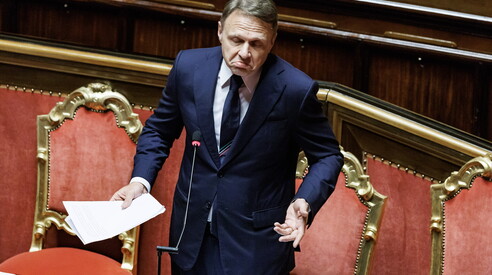Amaro Lollobrigida: bans, taboos on dealcoholized wine, and missing decrees. Here's the tariff blocking a market.


The story
It's not just Trump's tariffs on wine. A sector, that of dealcoholized wine, worth $2.6 billion, is still held hostage by bureaucracy and the ostracism of the minister and Coldiretti. The story
Here's Amaro Lollo , the first hard-to-digest liqueur. This is how an economy worth 2.6 billion euros, which could soar to 7 billion and which deserves the full attention of the Meloni government, is halted. It's about dealcoholized wine , the beverage that's upsetting the Minister of Agriculture (and Coldiretti). Trump is hitting wine with his 15 percent tariffs, but what is Lollobrigida doing to revive a threatened sector? Demand for dealcoholized wine has grown; Italians consume it, Arab countries buy it, it's produced in France, in Germany : why not in Italy? First, Lollobrigida's crusade, "don't call it wine," then, the about-face, "let's do it." Yes, but how? Bans, backtracking, and now we're missing the interministerial decree. Let's not buy into it.
What have entrepreneurs been doing since time immemorial? They seek new routes, new markets, and try to satisfy consumer demands. Well, the European market, and beyond, demands dealcoholized wine. The alcohol is removed with a membrane system, a bit of Bacchus is removed, but the product is popular and sells. And how! Even the king of Barbaresco, the Mozart of wines, Angelo Gaja, a reluctant convert, explained that "research will further refine the way these wines are produced."
What better opportunity than to market the product, especially now with Trump's tariffs? Even Lollobrigida, the Amaro Lollo, has converted, but unfortunately its conversion is only halfway there. Wine entrepreneurs, the Italian Wine Union, tell him: Minister, why are you waging an ideological war? Minister, look, the market is growing and dealcoholized wine is already sold in Italy, only it's sold in France and Germany. The ministry is convinced that a decree must be passed. On December 23, 2024, the decree arrives with stringent rules. It stipulates that to allow dealcoholization, separate premises, new warehouses are needed—in short, it must be done, but not in the same winery. The trade associations protest but don't miss the opportunity. Work begins, and with it come investments and bank loans. Suddenly, the ministry backtracks: a new plant isn't needed, just that the premises are not connected. And what did they need to say before? The investments made? They're done.
There would also be something fun to be had with the use of language. The first draft of the decree mentioned "dealcoholized" wine, but the minister doesn't like it. Lollobrigida is known to be a master of the language, refined, and recently even discusses penicillin and vaccines in place of Health Minister Orazio Schillaci. The word "dealcoholized" is removed from the draft and replaced by "dealcoholized." Oh, and another caveat: no one should dare use the word "alcohol-free." Can production begin at this point? Nope.
To produce dealcoholized wine, alcohol is extracted, but for the state, alcohol means excise duties, and how can the excise duty on this extracted alcohol be determined? The excise reform decree states that the other, the ministerial decree on excise duties on dealcoholized wine, will indeed come into force, but only in January 2026. But how? 2026? It's clear to everyone that the entry into force must be brought forward, and it is brought forward, except that the article regarding dealcoholized wine is not included among the anticipated measures. An oversight by the offices? More protests, corrections. And so we arrive at June. It's not over. Currently, the interministerial decree from Masaf and Mef is missing. At this point, one of two things: either it's bureaucracy, or bureaucracy is being used to prolong a decision they don't want to make. And why don't they want to make it? It goes without saying that dealcoholized wine is taboo for Coldiretti, which suggests calling it a "grape drink," and that Coldiretti is Lollobrigida's decanter. Let's be clear, not just Lollobrigida's. There's no evidence that the Democratic Party has ever fought to tell Lollobrigida: "Come on, Minister, let's run, let's sell dealcoholized wine." Another battle would be this: Minister Lollobrigida, are we going to sign the Mercosur treaty? Italy continues to oppose it at the European level. Thanks to that treaty, and Confindustria is demanding it, the Latin American market would open up, a new market beyond Trump's America. Nothing. Let's get back to dealcoholized wine. After all, is anyone producing it in Italy? Yes, it's produced by distilleries that can already dealcoholize without any problems. Unfortunately, the quality is far inferior to that of wineries that operate with more advanced technologies. This is Amaro Lollo , the liqueur made from select herbs: ideology, Coldiretti, and local produce. Side effects: promotes decline and indigestion.
More on these topics:
ilmanifesto





